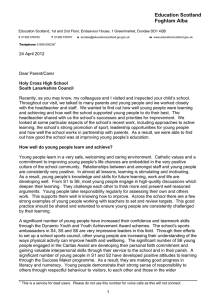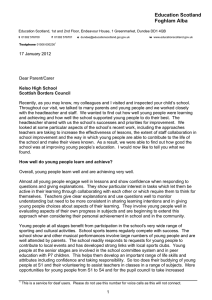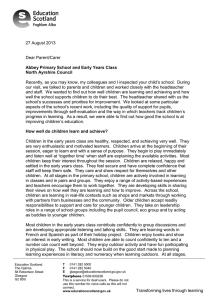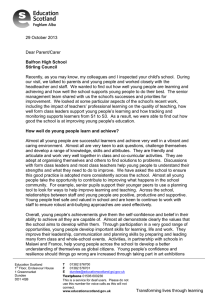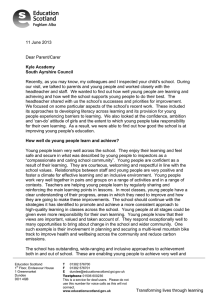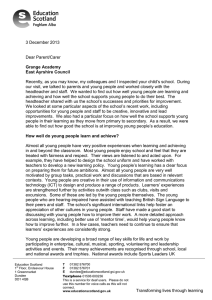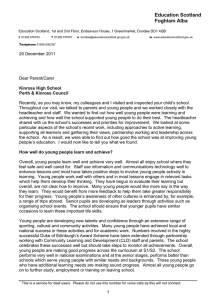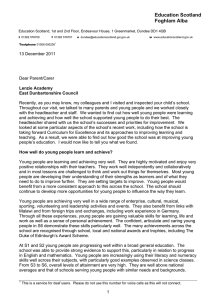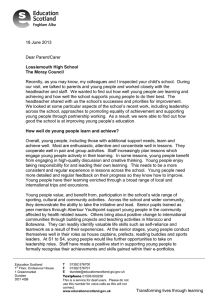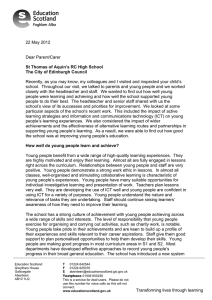20 January 2015 Dear Parent/Carer ’s school. During
advertisement
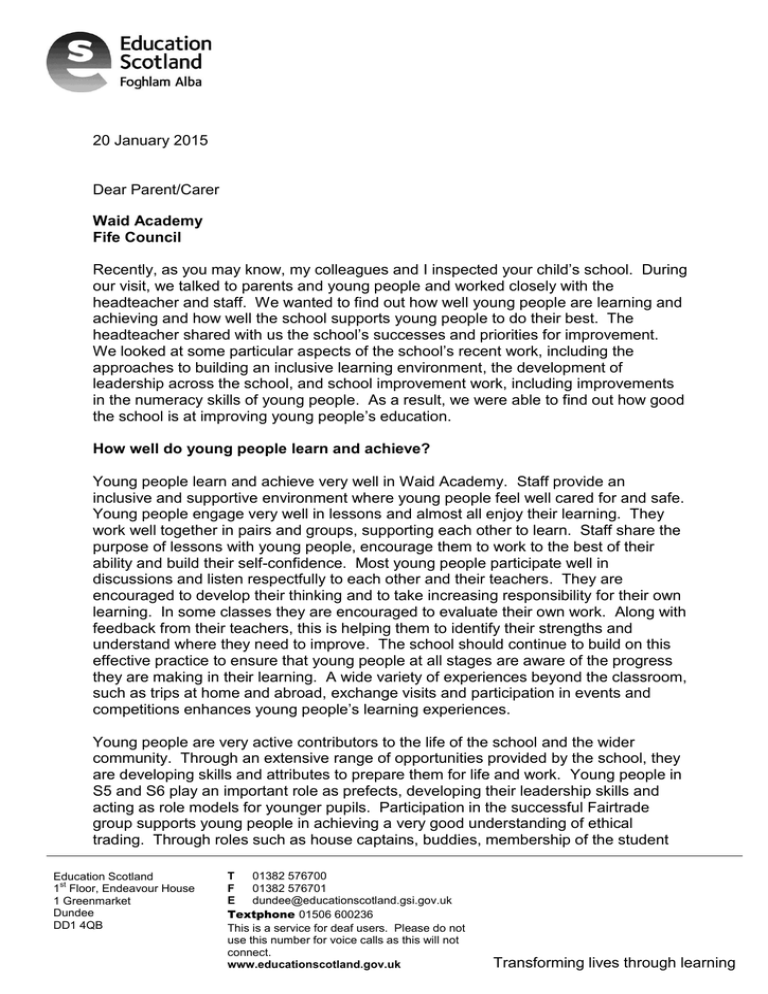
20 January 2015 Dear Parent/Carer Waid Academy Fife Council Recently, as you may know, my colleagues and I inspected your child’s school. During our visit, we talked to parents and young people and worked closely with the headteacher and staff. We wanted to find out how well young people are learning and achieving and how well the school supports young people to do their best. The headteacher shared with us the school’s successes and priorities for improvement. We looked at some particular aspects of the school’s recent work, including the approaches to building an inclusive learning environment, the development of leadership across the school, and school improvement work, including improvements in the numeracy skills of young people. As a result, we were able to find out how good the school is at improving young people’s education. How well do young people learn and achieve? Young people learn and achieve very well in Waid Academy. Staff provide an inclusive and supportive environment where young people feel well cared for and safe. Young people engage very well in lessons and almost all enjoy their learning. They work well together in pairs and groups, supporting each other to learn. Staff share the purpose of lessons with young people, encourage them to work to the best of their ability and build their self-confidence. Most young people participate well in discussions and listen respectfully to each other and their teachers. They are encouraged to develop their thinking and to take increasing responsibility for their own learning. In some classes they are encouraged to evaluate their own work. Along with feedback from their teachers, this is helping them to identify their strengths and understand where they need to improve. The school should continue to build on this effective practice to ensure that young people at all stages are aware of the progress they are making in their learning. A wide variety of experiences beyond the classroom, such as trips at home and abroad, exchange visits and participation in events and competitions enhances young people’s learning experiences. Young people are very active contributors to the life of the school and the wider community. Through an extensive range of opportunities provided by the school, they are developing skills and attributes to prepare them for life and work. Young people in S5 and S6 play an important role as prefects, developing their leadership skills and acting as role models for younger pupils. Participation in the successful Fairtrade group supports young people in achieving a very good understanding of ethical trading. Through roles such as house captains, buddies, membership of the student Education Scotland st 1 Floor, Endeavour House 1 Greenmarket Dundee DD1 4QB T 01382 576700 F 01382 576701 E dundee@educationscotland.gsi.gov.uk Textphone 01506 600236 This is a service for deaf users. Please do not use this number for voice calls as this will not connect. www.educationscotland.gov.uk Transforming lives through learning congress and Active Schools ambassadors, young people are demonstrating their commitment to the school community. Beyond the school, young people also develop as responsible citizens by contributing to the local community. For example, they work in partnership with the local food bank, help at local primary schools and raise funds for the Royal National Lifeboat Institute. Young people are volunteers in a range of activities in their local community, in and beyond Anstruther. Significant numbers have gained Saltire Awards as a result of their voluntary work. A wide range of sports clubs and activities enable young people to develop their confidence and resilience. Clubs include netball, rugby, fitness, football, hockey and basketball. Young people develop their confidence and performance skills through participation in musical and theatrical events such as singing in choirs and taking part in school shows. Enterprise and employability skills are being developed through activities such as the Eco Warriors Challenge, Food and Drink Challenge and Citizenship Challenge. Young people studying hospitality develop their practical skills by providing high-quality catering for whole-school events. The school celebrates the achievements of young people well, including through displays, award ceremonies and newsletters. The school is currently developing a clearer view of young people’s progress from S1 to S3, across all curriculum areas. From S4 to S6, overall, the attainment of those leaving school, including in literacy and numeracy, is similar to that of others with similar needs and backgrounds across Scotland and there are improving trends in some important measures. Almost all young people are successful in moving on to employment, training or further learning when leaving school. In recent years, increasing numbers are entering higher education. How well does the school support young people to develop and learn? Within Waid Academy’s inclusive learning environment, young people are supported very well to develop and learn. Most teachers plan tasks and activities well to meet the needs of young people. The school is committed to ensuring the appropriate level of challenge in learning for young people in all classes. The support services centre provides a caring and nurturing environment where young people requiring additional support feel safe and included. Support staff have a very good knowledge of the needs of learners and use a range of well-judged strategies to help young people make the best possible progress in their learning. They work very well with a range of partners, including social work, community learning, Barnardo’s and Families First, to meet individual needs. Staff from the support team have worked together with teachers across the school to maintain a high standard of behaviour among young people. The school ensures that young people with the greatest needs are fully supported to make progress in their learning. Staff are making good progress in reviewing and developing the curriculum to reflect the principles of Curriculum for Excellence. The school’s values have informed the developments and the views of staff, young people and parents have been taken into account. New approaches and courses are in place in curriculum areas to provide most young people with opportunities to make suitable progress in their learning. There is scope to provide more opportunities which allow young people to link and apply their learning. The school has made good progress in supporting young people to develop their literacy skills across their learning. Staff should continue with the work to develop a shared understanding of developing young people’s skills in numeracy 2 and in understanding their health and wellbeing. Partnership working enhances the opportunities provided, with a wide range of organisations supporting young people’s experiences. Partners include Scottish Fisheries Museum, Fife Coastal and Countryside Ranger Service, Cambo Estate and the Anstruther and District Allotment Association. These strong partnerships help place the school at the heart of its local community. Young people are very well supported to make the transition from primary school. Staff should continue to work across the sectors to ensure all young people can build on their prior learning and achievements. How well does the school improve the quality of its work? The school has very effective arrangements for improving its work. The headteacher’s clear vision for the school has led to an inclusive and supportive environment. Staff have a strong commitment to improving outcomes for all young people and take leading roles in driving forward school improvements. The school regularly seeks the views of young people and parents to inform its work. It has a very rigorous and robust approach to reviewing young people’s performance in national qualifications. This has resulted in improved levels of attainment overall. Teachers’ continuing professional learning is very effective in supporting improvements to learning and teaching. Teachers share their learning well through, for example, discussing the most effective practice to support young people to make the best possible progress in their learning. Staff and young people across the school participate in a range of activities, sharing the responsibility for improving the work of the school. The headteacher and depute headteachers provide strong leadership for school improvement. They encourage staff to be reflective and take forward new ideas. As a result, the school is very well placed to continue improving the quality of its work. This inspection found the following key strengths. Young people who are enthusiastic learners and contribute very well to the life of the school. The inclusive and nurturing ethos of the school which has strong partnerships with its local community. The very effective culture of leadership at all levels established by the headteacher. The involvement of staff and young people in improving the work of the school. We discussed with staff and Fife Council how they might continue to improve the school. This is what we agreed with them. Continue to develop the curriculum. Continue to implement the priorities in the well- judged school improvement plan to further improve the achievements of all young people. 3 What happens at the end of the inspection? We are satisfied with the overall quality of provision. We are confident that the school’s very effective self-evaluation processes are leading to improvements. As a result, we will make no further evaluative visits in connection with this inspection. During the inspection, we identified aspects of innovative practice which we would like to explore further. We shall work with the school and Fife Council to record the innovative practice and share it more widely. Carol McDonald HM Inspector Additional inspection evidence, such as details of the quality indicator evaluations, for your school can be found on the Education Scotland website at http://www.educationscotland.gov.uk/inspectionandreview/reports/school/primsec/Wai dAcademyFife.asp If you would like to receive this letter in a different format, for example, in a translation please contact the administration team on the above telephone number. If you want to give us feedback or make a complaint about our work, please contact us by telephone on 0141 282 5000, or e-mail: complaints@educationscotland.gsi.gov.uk or write to us addressing your letter to the Complaints Manager, Denholm House, Almondvale Business Park, Livingston EH54 6GA. 4
